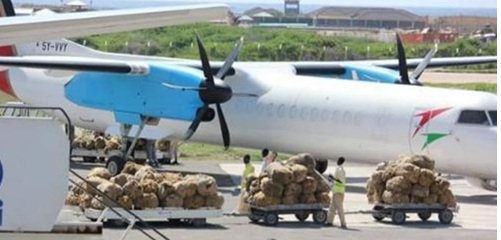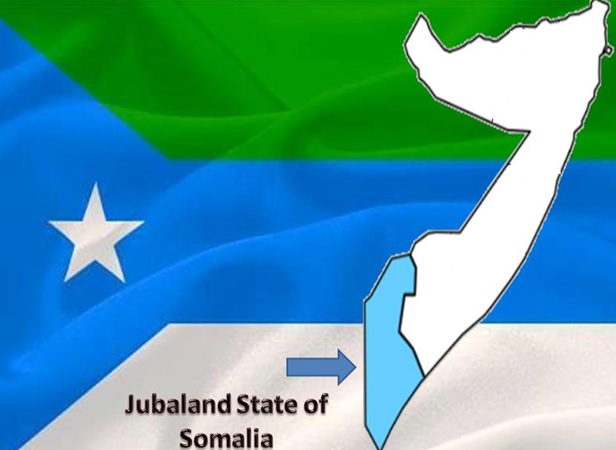By Abdullahi A. Nor
In the grand theatre of Somali politics, where irony and hypocrisy often take center stage, President Hassan Sheikh Mohamud has managed to pull off a spectacular act. Once a vocal critic of weaponizing civil aviation, he has now become its master practitioner. In a move that would make even the most hardened autocrats raise an eyebrow, the Somali president has effectively imposed an aviation blockade on Jubaland, turning it into yet another Gaza—except with more goats and fewer news headlines.
For the people of Jubaland, travel has become a privilege reserved only for cargo flights carrying one very specific and lucrative commodity: khat, the mild narcotic beloved by chewers and despised by dentists. Apparently, while sick patients and stranded MPs can’t get a single commercial flight to Kismayo, a steady stream of khat shipments continues uninterrupted. Why? Because the president’s family allegedly pockets a cool $4.5 per kilogram. Who needs hospitals when you have a booming drug trade?
The Siege of Jubaland: A Violation of International Law
The aviation blockade of Jubaland is not just cruel—it’s illegal. International conventions, including the Chicago Convention on International Civil Aviation (1944) and the International Covenant on Civil and Political Rights (ICCPR, 1966), prohibit the use of civil aviation as a political weapon. The Chicago Convention, which Somalia is a signatory to, mandates that civil aviation should be used for peaceful purposes and ensures non-discriminatory access to airspace and airports. In simpler terms, a president cannot ground planes just because he doesn’t like the people on board.
Blocking flights means denying sick people the ability to seek medical treatment in Mogadishu or Nairobi. It means preventing businesspeople from accessing markets. It means turning entire federal member states into isolated islands, where even government representatives cannot return to their constituents.
Jubaland MPs stationed in Mogadishu have been effectively grounded, unable to travel home. Ironically, these same MPs were once part of a movement that championed the right to free travel when Hassan Sheikh Mohamud himself was in the opposition. But political memory, like airline customer service, is notoriously unreliable.
From Reformist to Ruler: A Presidency of Broken Promises
Perhaps the most staggering aspect of this entire aviation debacle is the sheer hypocrisy of it all. When Hassan Sheikh was in the opposition, he railed against government overreach, accused the previous administration of corruption, and promised to be a man of the people. Now, he presides over the most nepotistic administration in Somalia’s history, one where every key position has been handed to relatives, clan members, or childhood friends with dubious qualifications. If Somalia were a family business, this would be a textbook case of corporate fraud.
Under his leadership, public land has been sold off like second-hand camels at a market, bypassing the treasury and landing directly in the pockets of shady businessmen linked to his inner circle. While Somalia’s people struggle with poverty, displacement, and insecurity, the president and his allies are making deals that would make 19th-century colonialists envious. Somalia was once known as the nation of poets, but under this administration, it’s becoming the nation of backroom deals.
Selective Flights: When Khat is More Important than Patients
If there is one flight route that remains untouched by politics, it is the daily khat deliveries from Kenya. While hospitals run out of medicine, the president ensures that his favorite narcotic arrives on time. Business must continue, after all, and at $4.5 per kilogram, it’s a very lucrative business indeed. If only Somalia’s infrastructure or education system received the same level of attention as this leafy stimulant.

The absurdity of it all would be funny if it weren’t so tragic. The aviation blockade has turned Somalia’s airspace into a bizarre parody of governance, where the only flights guaranteed to land in Kismayo are those carrying bags of green leaves, while doctors, teachers, and ordinary citizens remain stranded.
A Dangerous Precedent for Somalia’s Future
This policy of aviation suppression is not just a Jubaland problem. It sets a dangerous precedent for all of Somalia. Today, it is Jubaland that is under siege. Tomorrow, it could be Puntland, South West State, or any other federal member state that dares to disagree with Villa Somalia.
Somalia’s federalism was designed to prevent this very scenario—one man using the instruments of state to punish his political rivals. By turning the aviation sector into a political weapon, the president is not only violating international law but also eroding the fragile trust between Somalia’s federal member states and the central government.
The Need for International Intervention
The international community, so quick to issue statements on democracy and human rights, has been strangely silent on this matter. Perhaps they are too busy drafting their next round of “concerned” press releases to notice that an entire federal member state is being strangled.
But silence is not an option. The aviation blockade is not just a political maneuver; it is a humanitarian disaster in the making. The sick is dying because they cannot travel for treatment. Families are separated. Businesses are collapsing. If this continues, it will only breed more resentment and deepen Somalia’s already fractured political landscape.
The Somali people deserve better. They deserve a leader who does not treat airspace like a personal chessboard. They deserve a government that upholds the rule of law, not one that bends it for personal gain. And most of all, they deserve the basic human right to travel freely within their own country.
Somalia’s Skies Must Remain Open
In the grand scheme of things, Hassan Sheikh Mohamud’s aviation blockade will not stand the test of time. Leaders come and go, but the people remain. History has shown that no ruler, no matter how powerful, can permanently suppress a people’s right to freedom.
The international community must take a stand against this blatant abuse of power. Somalia’s federal member states must unite to demand accountability. And the Somali people, ever resilient, must continue to resist policies that seek to divide and control them.
The skies belong to the people, not to politicians. And no president, no matter how greedy, corrupt, or power-hungry, has the right to turn civil aviation into a tool of oppression. As the khat flights continue to land smoothly, one can only wonder: if only democracy and human rights were as profitable, perhaps the president would pay them as much attention.
Abdullahi A. Nor
Email: abdulahinor231@gmail.com


Leave a Reply